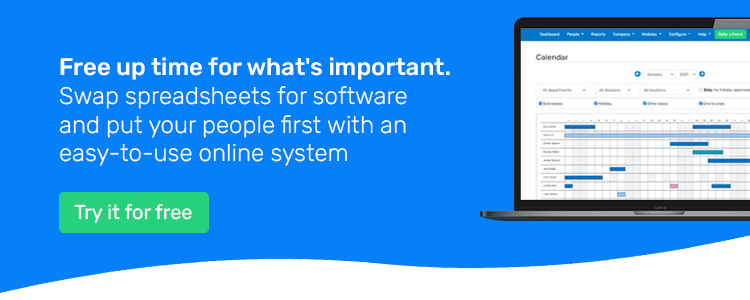Everyone knows what to expect in a traditional performance appraisal.
But how can you make them as useful as possible for your team - and your business?
In this blog, we cover tips for small business owners & managers on ensuring your performance appraisals are as effective & valuable as possible.
Types of performance appraisal methods
There’s no single way to run a performance appraisal. The best approach depends on your team and what you want to achieve.
Here are a few of the most common methods:
-
360-degree feedback
This method gathers feedback from different people your employee works with, such as managers, peers and direct reports. This gives a well-rounded view of how they’re doing. -
Self-assessment
Asking employees to reflect on their own performance helps them take ownership of their development. It also opens up a more balanced, two-way conversation. -
Management by objectives
This approach is all about setting clear, measurable goals at the start of the review period, then evaluating progress against them. This shows how their work contributes to the bigger picture.
Each of these methods can be used on its own or combined. What matters most is choosing an approach that fits your performance appraisal process, encourages open conversations and helps your people grow.
6 tips on how to conduct an effective performance appraisal:
1. Prepare
Preparation is key - both for the employee & the person running the appraisal.
It's a good idea to review previous notes around performance and to look at previously agreed objectives or goals. Have these been met? What have you observed throughout the process? Encourage the employee to make their own notes in preparation for the review as well.
2. Create an agenda
Just like in any other meeting, an agenda will help to guide the direction of the discussion. Agendas can help you ensure you cover all you need to in an appraisal, including next steps.
After you’ve created your agenda outline, you could send it to the employee and invite them to add any additional points they'd like to discuss. A performance review is not a one-way conversation, and it may well be that an employee will go into the appraisal with their own purpose (e.g. asking for a pay review), so it’s important to allow them to have the time to fulfil theirs.
Likewise, by each sharing your agendas, it allows you both to further prepare for the discussion. For instance, knowing that your employee wants to discuss their pay prior to the appraisal gives you the opportunity to look back at when they last received a pay review, rather than be blindsided by the question when it comes up.
 We want to make your life easier - which is why you can try Breathe for free for 14 days. Start your free trial & start saving time today.
We want to make your life easier - which is why you can try Breathe for free for 14 days. Start your free trial & start saving time today.
3. Discuss successes & challenges
Ask the employee for their thoughts on what they think went well during the review period, along with anything they struggled with.
Its crucial to ensure that when discussing an employee's performance that you do so in relation to any objectives or targets that they were set. It's important to have established these goals well in advance, as it's not fair to assess performance against criteria employees are unaware of.
It can be all too easy during a performance appraisal to focus on what improvements can be made. Remember to take some time to reflect on successes & celebrate them. Here are some ideas on what to say in an appraisal if you need some inspiration.
4. Discuss ideas for development
The majority of the performance appraisal should be focused on future development. Whilst it’s good to reflect on what has and hasn’t worked well, those elements are in the past and the appraisal should mostly focus on what the employee can do moving forward to achieve their objectives and contribute towards the company’s goals - that’s what motivates many people to work.
Discuss any career plans & development opportunities to help up-skill your employees (and help the business achieve its goals).
5. Agree actions
With the employee’s future development in mind, both the employee and the manager should come away from the performance review with an action plan. This needs to be an achievable plan with actions for each individual, including deadlines, to be able to facilitate the growth and development of the employee.
6. Summarise the meeting & provide further support
Conclude the appraisal by summarising what has been discussed and who is responsible for actions moving forward. It would also be a good idea to plan when you will meet again for the next performance appraisal. This gives the employee clarity and allows you to start to develop a regular feedback habit. You can take this opportunity to ask the employee to give you feedback.
When it comes to feedback and appraisals it’s important for small businesses to get the process right from the outset. Attracting and retaining talent has never been a more prevalent issue for businesses and a well-executed performance appraisal is the key to supporting & developing your team.
Common challenges and solutions in performance appraisals
Even with the best preparation, appraisals can sometimes feel daunting. The important thing to remember is that these challenges are common. Here are a few examples and how to overcome them:
-
Not enough preparation
A rushed meeting can feel unbalanced. Take time to review progress and encourage your employee to do the same. -
One-sided conversations
An appraisal should feel like a two-way exchange. Ask open questions and give space for your team member’s views. -
Unclear feedback
General comments don’t give people much to build on. Specific examples give people clarity and confidence to grow. -
Lack of follow-up
Ending on a positive note is great, but clear next steps matter. Agree actions together and set a time to check in. -
Avoiding tricky topics
It might feel easier to avoid tricky topics, but approaching them with kindness and clarity helps your team grow.
Handled well, the appraisal process can strengthen trust, support employee performance and play a valuable role in performance management.
Find out how Breathe's performance management software can help centralise your teams' appraisal notes & development records. Why not take out a free 14-day trial today?

Author: Aimée Brougham-Chandler
An IDM-certified Digital Copywriter (2023) & English Language & Literature graduate (BA Hons), Aimée is Breathe's Content Assistant. With 3 years' content marketing experience, Aimée has a passion for writing - and providing SME HR teams with solutions to their problems. She enjoys delving into & demystifying all things HR: from employee performance to health and wellbeing, leave to company culture & much more.





